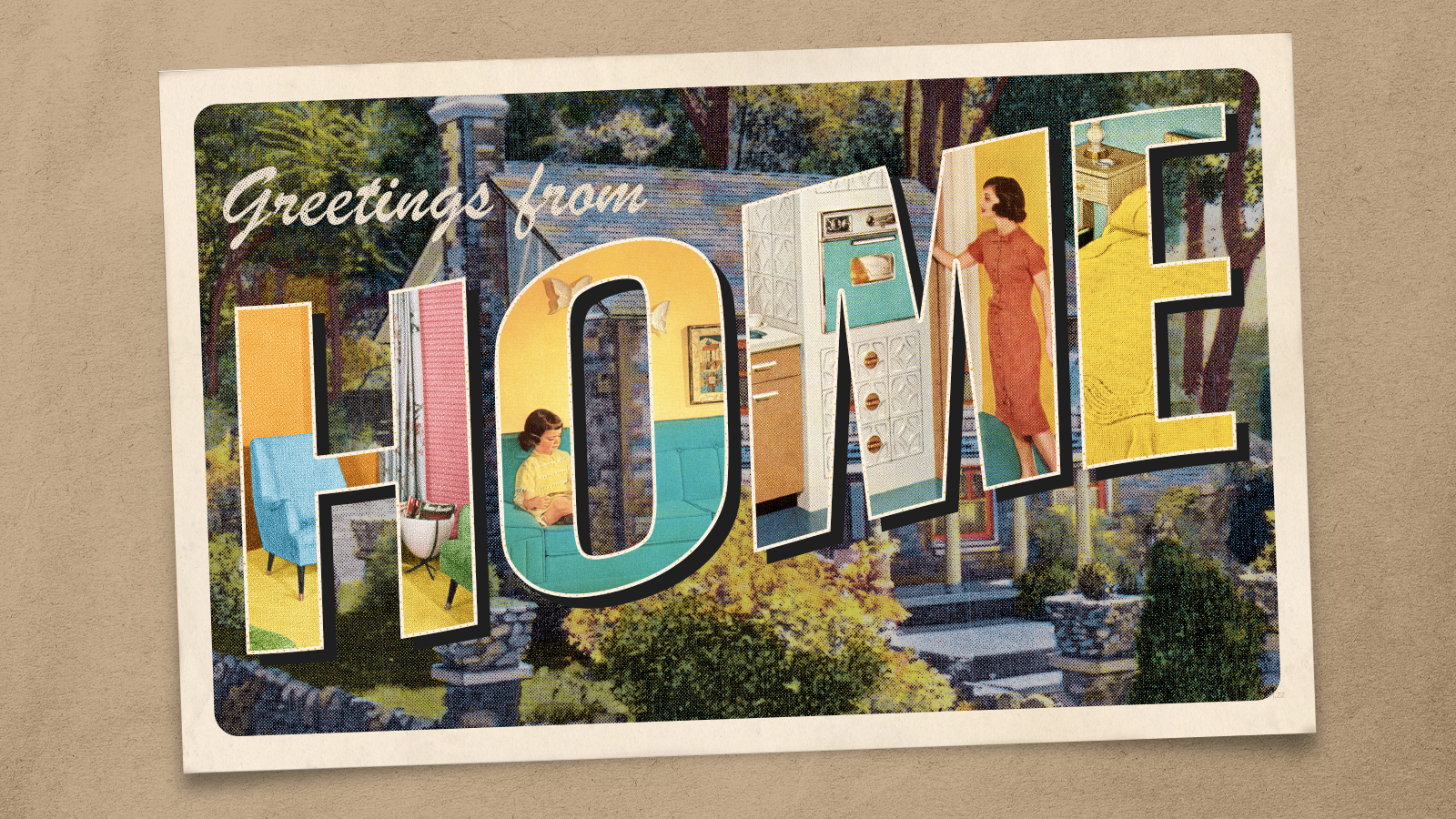There's no vacation from the quirks of English


A free daily email with the biggest news stories of the day – and the best features from TheWeek.com
You are now subscribed
Your newsletter sign-up was successful
Last week a friend mentioned that he and his wife had been on a "staycation": they spent a weekend at a hotel in the closest major city — an hour's drive away.
That's a staycation? They had to drive an hour from home to get there! In some places, that gets you to a whole other country. To Rhode Islanders, I'm told, it's an overnight trip.
Okay, but how about when my wife and I did an overnight at a nice hotel three blocks from where we live? We were almost at home. Does that count as a staycation?
The Week
Escape your echo chamber. Get the facts behind the news, plus analysis from multiple perspectives.

Sign up for The Week's Free Newsletters
From our morning news briefing to a weekly Good News Newsletter, get the best of The Week delivered directly to your inbox.
From our morning news briefing to a weekly Good News Newsletter, get the best of The Week delivered directly to your inbox.
The thing is, though, a staycation is staying for vacation. A vacation is when you vacate your premises. How can you stay? That would be like freeze-boiling.
Well, okay, the point is really that you're vacating your workplace and your work duties, not your home (although if you're working from home, it gets a little iffy… as it does if your work expects you to check email while you're away).
But we assume a vacation involves travel — otherwise why specify staycation? In spite of the historical link between torture and travel, we expect to spend our significant leisure time away from home. Our right to travel is sacred, even if airport security and border control may feel a bit like an inquisition.
Time off may even literally be sacred. When you take a week off to go somewhere and relax, if you don't say you're "on vacation," what do you say you're on?
A free daily email with the biggest news stories of the day – and the best features from TheWeek.com
Holidays. And holidays are holy days — it's right there in the word.
In many contexts, "the holidays" still refers to a period of important religious observances. From that, however, it has spread to government-mandated days off: federal holidays, state holidays, or, as they say in England, bank holidays (which really does imply something about God and money, doesn't it?). And if you're like most people, when you go on holidays, you're more likely to spend the time "sun worshipping" than in a religious establishment.
So, holidays aren't always holy. Vacations don't have to vacate.
Taking your work phone to the beach isn't the only paradox of leisure, it turns out! What else about time off seems to take leave of the original senses?
Well, tell me this: if you go on a journey, how long will you be away? If it's just a day trip, does it really seem to count?
A journey is a trip, sure, a stretch of continuous travel, but how often would you say you're journeying to somewhere 20 miles away? And yet a journey was, originally, a journée: a day's worth of travel. Which, in the Middle Ages, was thought to be about 20 miles. Heck, that's staycation range!
But say you do journey somewhere. And then you remain there for a sojourn. How long are you there?
You know where that's going, don't you, because you spotted the journ in sojourn. Yep, etymologically, it's a day's stay. Well, we've left that requirement behind. You can have a day's sojourn (somehow not redundant now), but you can also have a much longer one: Merriam-Webster's example for the verb sojourn is "sojourned for a month at a resort." Hopefully not a hard day's month!
We know, anyway, that travelling involves taking a trip. We also know that trip is a word for what you do if you catch your foot on something because you weren't treading lightly enough. That may be a little ironic: trip traces to a Germanic root meaning "step lightly, hop, skip." More ironic is the fact that if you're on a trip these days, you're probably sitting down a lot of the time — airplane trip and car trip are, in their origins, no less oxymoronic than staycation. But at least you'll be feeling footloose and fancy free. Right? Unless it's a business trip.
But if you are footloose and fancy free, you might go on an expedition. Guess what: that's appropriate, too, because it comes from Latin expedire, which refers to freeing the feet from fetters. But the usual figurative sense relates to expediting, meaning making something happen faster. Be sure to point that out next time you join an expedition and it's making slow progress because everyone is stopping to take pictures and shop at the souvenir store.
And even if it is a business trip, you might get lucky and be on a junket. There's no irony in junket, though it's taken an interesting route from its origins. In the 1400s, a junket was a sweet dairy dish, sort of a medieval progenitor to cheesecake; within a century, the term's use had spread to other sweets and desserts; from that it was a very short trip to using it to name a festive gathering, and in particular a pleasure trip with lots of food and drink. The only thing left to make it even sweeter was added in the U.S. in the later 1800s: the fact that your employer (originally typically the government) pays for it.
If you don't get a fully paid pleasure trip, but you do get lots of time off, that may be a sabbatical. But while a sabbatical is supposed to be an extended period (e.g., a year) of rest — that's what a sabbath is: a holy day (or year!) when you do not work — if you're in academia, you're expected to be working on a book or other major research project. Sure, you get time off from teaching, but so much for rest! More like a busman's holiday: a tour of duty rather than a scenic tour.
Tour, at least, presents no contradiction. It comes via French from Latin and Greek roots referring to circles, and the idea of a tour is that you do a trip that goes out, around, and back — and, just to reinforce that, when you're in any of many of the places you visit, you'll probably stand and turn around 360 degrees looking at the scenery.
Or, if you're on a staycation, you come back to sit with your computer or phone after stopping by the washroom and the kitchen. But don't check your work email! You're not at the beach, after all.
James Harbeck is a professional word taster and sentence sommelier (an editor trained in linguistics). He is the author of the blog Sesquiotica and the book Songs of Love and Grammar.
-
 The ‘ravenous’ demand for Cornish minerals
The ‘ravenous’ demand for Cornish mineralsUnder the Radar Growing need for critical minerals to power tech has intensified ‘appetite’ for lithium, which could be a ‘huge boon’ for local economy
-
 Why are election experts taking Trump’s midterm threats seriously?
Why are election experts taking Trump’s midterm threats seriously?IN THE SPOTLIGHT As the president muses about polling place deployments and a centralized electoral system aimed at one-party control, lawmakers are taking this administration at its word
-
 ‘Restaurateurs have become millionaires’
‘Restaurateurs have become millionaires’Instant Opinion Opinion, comment and editorials of the day
-
 The 8 best superhero movies of all time
The 8 best superhero movies of all timethe week recommends A genre that now dominates studio filmmaking once struggled to get anyone to take it seriously
-
 Josh D’Amaro: the theme park guru taking over Disney
Josh D’Amaro: the theme park guru taking over DisneyIn the Spotlight D’Amaro has worked for the Mouse House for 27 years
-
 The best fan fiction that went mainstream
The best fan fiction that went mainstreamThe Week Recommends Fan fiction websites are a treasure trove of future darlings of publishing
-
 Golden Globes affirm ‘One Battle,’ boost ‘Hamnet’
Golden Globes affirm ‘One Battle,’ boost ‘Hamnet’Speed Read Comedian Nikki Glaser hosted the ceremony
-
 ‘One Battle After Another’ wins Critics Choice honors
‘One Battle After Another’ wins Critics Choice honorsSpeed Read Paul Thomas Anderson’s latest film, which stars Leonardo DiCaprio, won best picture at the 31st Critics Choice Awards
-
 The best alcohol-free alternatives for Dry January
The best alcohol-free alternatives for Dry JanuaryThe Week Recommends Whether emerging from a boozy Christmas, or seeking a change in 2026, here are some of the best non-alcoholic beers, wines and spirits to enjoy
-
 13 Gen Z workplace terms and phrases
13 Gen Z workplace terms and phrasesin depth From ‘quiet firing’ to ‘resenteeism,’ there are clues about why employers and employees in America are having such a sad time
-
 Let these comedians help you laugh your way through winter
Let these comedians help you laugh your way through winterThe Week Recommends Get some laughs from Nate Bargatze, Josh Johnson and more
